Interview: Indie Filmmaker David Spaltro On Life, THINGS I DON'T UNDERSTAND And Independent Filmmaking
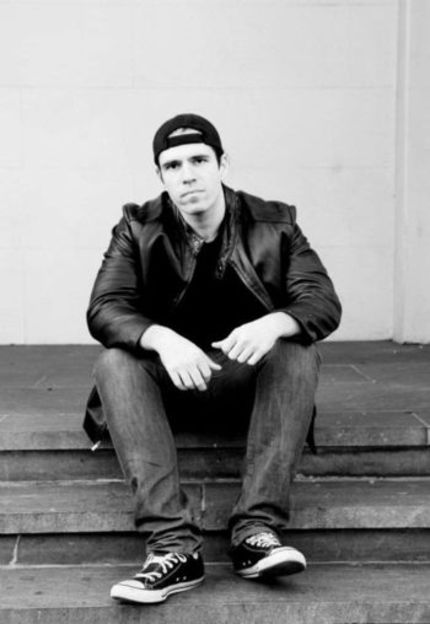
THINGS I DON'T UNDERSTAND is a fantastic independent film that I got the opportunity to watch and review recently, and it was an absolute pleasure for me to catch up with the film's director David Spaltro to talk about life, TIDU, and independent filmmaking.
Independent filmmaking can be both challenging and rewarding. Tell us the things you like and dislike the most about being an independent filmmaker.
An actor on my first film who had participated in a ton of critically acclaimed films during the indie explosion of the early 90's told me something a writer-director said when their film was at Cannes, "I'll never have this much freedom again". I think the beauty of independently going out and making a film is that you have a bit of creative freedom with the story you want to tell and being able to have the final say in how you tell it and what it becomes. You lose other freedoms like time, money and the ability to dream bigger than your budget.
I guess the time thing is my biggest pet peeve. You're often running under the gun or pushing people into overtime and still making decisions on the fly that isn't quite "giving up" but definitely compromising your vision a bit. Even when supported with passionate and skilled artists who believe in you and your story you can achieve great things in those circumstances but definitely having more time to get it right and having more support during post-production or in distribution ahead of time would make a huge difference.
There's a glut not just of films but also of all kinds of media out there right now and you can kill yourself for years and make something really special that just can't find its audience no matter what you throw at it because it doesn't have that same financial promotional train or media behind it. It's a never-ending fight not just to make a film and finish it but also then to get it seen. On the flipside I really enjoy the way not having a limitless bank account and all those tools forces you to creatively think outside the box and sometimes be more creative with how you approach things. You have to be so specific and so much more prepared when going into a film with a smaller budget and that definitely forces you to be more on your game and concrete with what you want to achieve because you won't get many chances or do-overs. You need to know what you want to achieve when you get to set from your cast and crew because we lose the light or the location in just a couple of hours and I think while that can be a lot of pressure it can be good artistic fuel sometimes.
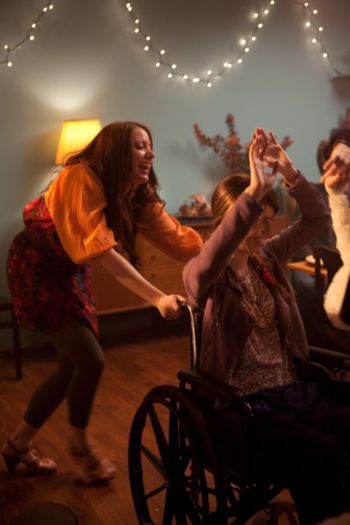
In your new film THINGS I DON'T UNDERSTAND, you discuss many of life's big issues. What made you decide to make a film about serious subject matters like relationships, love and death?
I think those themes are always reflected in and going to be reflected in my work. My first feature "...Around" dealt with issues that were similar and the idea of finding your place in the world, home and family, as well as how relationships that you make change those concepts and yourself. That film was written when I was 23 and more about my experiences of 18-22 when first moving to NYC so since that time and especially in the making of that film and all that came after it I'd matured as a person and my experiences and felt I had other things to say on the matter.
The main character of my first film "Doyle" is far more a snapshot of me as a teenager and in my early 20's while TIDU's "Violet" is probably a lot more of myself in present day or the last couple of years and my take on those themes closer to my 30's. One of the misconceptions of TIDU is that it's a film about death and to me it was always more a story about really living and the hardships, simple joy and confusion of what that means which often includes death, loss and acceptance of ourselves and mortality. It was always about an atheist looking for a miracle and finding not answers but more questions that at first burned her out and then eventually, when she sort of gave in and embraced the quest which is life, realized it was the singular journey of each of us that really mattered.
You got to work with a wonderful cast in THINGS I DON'T UNDERSTAND. Many of the actors and actresses in the film, such as Molly Ryman and Grace Folsom, seem to have very different styles of acting. Did that make your job as the director easier or harder?
Casting is a very essential part of the process of making a film, at any budget, to me, as really talented actors can be the greatest special effect. No matter how good or complete a script or story is you need to have talented and passionate individuals to put life into those words and full realize your characters and their arcs. I take a lot of time with casting and really trying not to just find individuals with the right chops but who really fit and can do a certain role justice, like fitting someone in magic slippers or a perfectly tailored suit.
I occasionally write a role for an actor I've worked with in mind like Molly Ryman for this project and also Nabil Vinas who had a small role in my first film and just knocked it out of the park with his supporting role as Joe the hospice worker in this film. Working with someone like Molly on this film was an interesting experience and completely different than the first time I worked with her, not just in scope but also in how involved it was going to be for her. She wanted the challenge but I think many times the pressure of it, the exhausting hours and anxiety over getting it right could get to her, as I know it got to me. There was at time a lot of friction on the set between us because the same intimate friendship we'd developed through working together and the last few years that would help us work together on this also caused some miscommunication. There was even at times a total communication breakdown as she admitted she tried to hide her version of Violet from me until shooting because she was afraid it wasn't what I was looking for and a lot more butting heads on how to play the character.
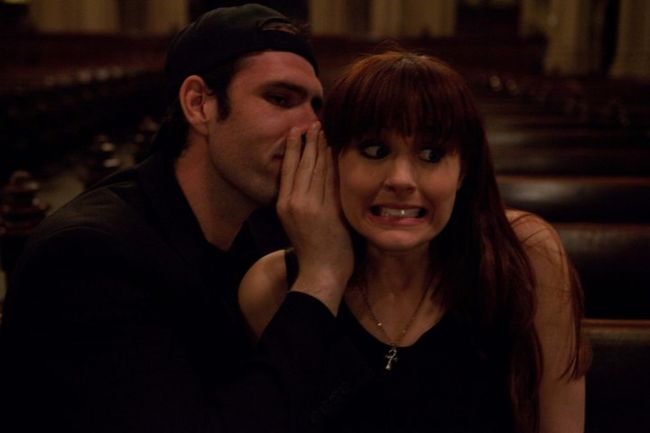
My role was harder in that I wasn't just giving her a challenge but wanted to live up the responsibility to push her as hard and far as I knew she could go with it and I feel like I did and she did a great job with Violet. I don't think anyone really could have played it like she did. Molly has a natural beauty and sweetness and genuine quality about her as a person that would allow an audience to relate to Violet even when she can be hurtful, abrasive or off-putting. Hopefully we both grew a lot from the experience of collaborating as intensively on this project and can take that into whatever we do next on our own journeys.
Someone like Grace though was not only an amazing find for that role and of a young actor, this being her first film, but she was just one of those rare occasions where it's just effortless. Grace always did her homework and brought great ideas to the character and just took whatever little adjustments I gave her and incorporated them with ease. She was so appreciative of the project and the people around her, her positive energy and support was a Godsend and she'd come over to my little video area and tell me how thankful she was to be in the film and hoped she was doing a good job.
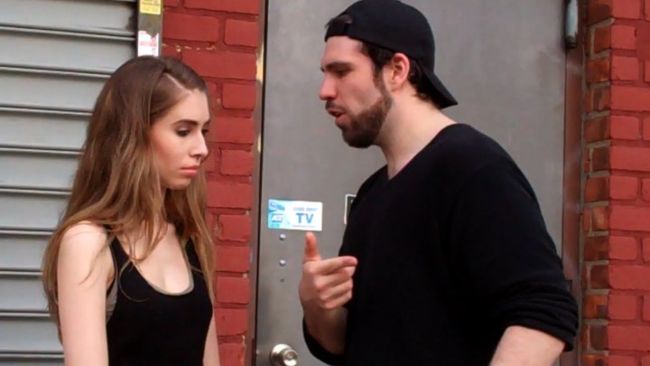
Lynn Justinger, Eleanor Wilson, Jenna Laurenzo, Aaron Mathias, Mike Britt and a host of others big and small in the film were just so great and brought so much to whatever they had to do. They pretty much made the experience and the film for me. Consequently even with diligence you can make a few mistakes and I also had to work with a very difficult and embittered actress on this production who just brought the wrong kind of energy to set, constantly complained and refused to listen to direction, overplaying her character to the point where it and their story arc had to be re-cut and trimmed after several test screening complaints that singled out her performance and character.
You have titled your film 'THINGS I DON'T UNDERSTAND'. Did making the film actually help you understand anything that you didn't before?
The full experience of making TIDU was a really important and sometimes agonizing life lesson I had to go through. I think the pressure I put myself under to get this film made, unexpected obstacles that arose, the fights I had with individuals and some personal matters kind of broke a part of me by the end of it. I had never been as emotionally or physically exhausted in my entire life by the time we finished the film and when you're that empty you really get a chance to see what your core is.
I withdrew for a while from my "normal life" to really ask some questions on the last couple of years and why I do what I do and what I really wanted my future to be. I'd considered at one point this project being a bit of a "swan song" with filmmaking and that I maybe had a chance to really say all I had to say with this film and I could find other avenues to express myself. I realized in finishing the film and talking with some good friends that it was not just something I DID it was something I AM. I'm a storyteller and whether that means making another film again or writing a book or just doodling on napkins I'm going to tell stories until the day I have no more breath in my body. I have a million more to tell and right now feel like creatively I'm just getting warmed up with a couple of new projects in the pipeline, new opportunities through the response TIDU and "...Around" have gotten.
What's great though as someone who's fought a lot his entire life, is that I no longer feel any pressure or care about battling anyone to do anything else. I've found a simple joy and love for creating and working that I think was gone when I went into TIDU and the experience of making it. When I was younger I was ready to take on the entire world armed with a shredded dirty coat, taped up Converse and a million different lives with a credit card for each of them. I didn't care if I won or lost these battles I was just prepared to give them a goddamn good fight. Now, though, after this last experience I've found my love and joy for just doing it and as my great teacher and colleague Lisa Eichhorn used to tell me, "love is the answers no matter the question". So I'll throw myself into the fray a few more times and see where it takes me but I'm embracing the future and all that comes with and enjoy the ride and the people that want to come along with me.
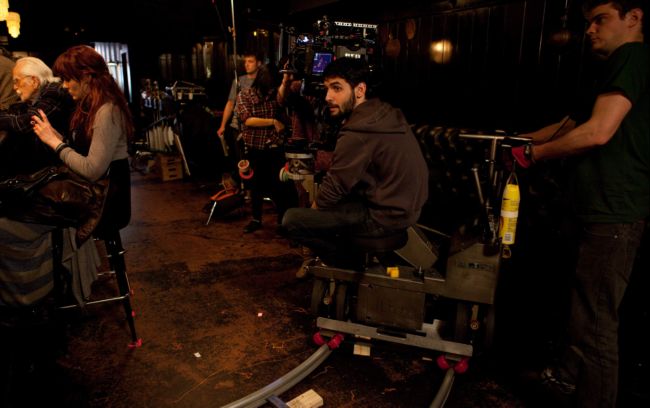
You have made both of your feature films on limited budgets. If say you get given a bigger budget to make one film of your choice, what kind of film would it be, and why?
I think I've always admired a career like Billy Wilder's or even today's Danny Boyle in that they are storytellers first and foremost and whatever genre they jumped to they had great characters and a great story. For me the budget wouldn't mean I'd suddenly do a mega million giant popcorn summer film or anything in particular, though I'd love to try my hand at everything at least once, it would just mean that whatever story I told I'd have a little more time and faculties to do it.
One of the perks of working on TIDU was the chance to work from pre-production on both sound and visuals after seeing how important a difference they can make in a story on my first film. I got to play around with score and music with Storm at Creative Mixing but also play with visual effects and color correction with our amazing artist Blasé Theodore at Contact Post-DI that went beyond just making sure things were okay but actually getting artistic with effects and color grading. I think having more of a budget and being able to better realize or incorporate your ideas would be fun to push further in the future for visual and audio storytelling.
.jpg)
Can you tell us something about the projects you've been working on since THINGS I DON'T UNDERSTAND?
I'm currently juggling a few other potential projects like a TV pilot, some treatments and a passion project to adapt a story about rocket scientist Jack Parsons. I'm halfway through writing a 3 rd. and final valentine to the city of New York and the themes and ideas I've experienced called "Wake Up In New York" that's very inspired by where I've been and where I'm going. It's going to deal a lot with the process of writing and creating and how that changes over time that will be a bit of a bookend of a long journey I started with "...Around". It'll also give me a chance to reunite with some TIDU actors like Lynn and Grace and some other faces I've not had a chance to collaborate with yet, sort of an all-star ensemble and farewell indie project that may or may not be the next thing I do but could possibly be ready to go Winter/Spring of 2013.
Finally, what advice would you give to aspiring filmmakers?
As always I'd say to just go out there and tell you story and don't be afraid to fail. The only time you have any growth is when you leave your comfort zone to do something you might fail at. Whether you end up achieving your goal or having to start from scratch you can still learn and get better but it starts with a little risk. I'd tell them to be in it for the long haul and even in the best circumstances a feature film is about three years of your life day in and day out regardless of what else is going on. It's an emotional and psychological rollercoaster and you don't always get to feel or express it because you're the leader and you have to stay focused, strong or lead your team in uncertain conditions even if you don't fully know the answer yourself.
I'd also advise them to remain vigilant and go out there and make their own mistakes and not listen to everyone who's telling them they "can't" or "shouldn't". I'm a fan of collaboration and you should always keep an ear out for advice or constructive criticism but I've seen how this world can be full of people who love to tell you what you can and cannot do and put these glass ceilings on your potential. I've spent most of my career proving them wrong time and again. I believe the only one who can limit your potential is you and a lot of these naysayers have such a clear vision of what you should and should not be doing is because they're always the ones watching from the sidelines, never in the mix themselves. So go out there and just tell your story. Grab a flip-cam, a cellphone, some friends, some construction paper; whatever you have access to and just tell your story.

Do you feel this content is inappropriate or infringes upon your rights? Click here to report it, or see our DMCA policy.






